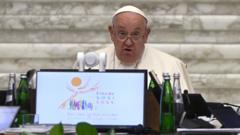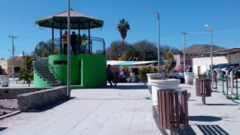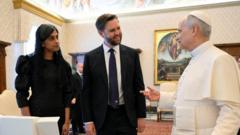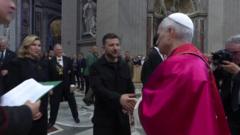The recent synod highlighted a commitment to women's leadership roles within the Catholic Church, although it did not advocate for the ordination of female priests.
Papal Summit Concludes with Emphasis on Women's Leadership in the Catholic Church

Papal Summit Concludes with Emphasis on Women's Leadership in the Catholic Church
A Vatican meeting urges for increased female representation but stops short of ordination.
The month-long synod at the Vatican concluded with a significant call for greater leadership roles for women within the Catholic Church, albeit without a push for the ordination of female priests, a reform some progressive factions had anticipated from the outset. Pope Francis initiated this synod as part of a four-year global consultation to gather insights from Catholics worldwide, and notably allowed the participation of nearly 60 women among the 368 voting delegates, marking a departure from traditional bishops’ conferences.
Voting took place on 151 distinct proposals, all of which passed with the required two-thirds majority. However, the proposition advocating for increased leadership roles for women faced the highest number of dissenting votes, reflecting ongoing tensions within the Church's predominantly male hierarchy. Although the synod did not endorse female deaconship—a role currently reserved for men—the final statement asserted that there should be no obstacles preventing women from assuming leadership positions in the Church.
Additionally, despite calls for more inclusive approaches toward the LGBT+ community, the final document made only a vague acknowledgment of those feeling excluded based on "marital status, identity, or sexuality," without specific initiatives mentioned. Reverend James Martin, a synod member advocating for LGBT inclusion, expressed a sense of predictability regarding the lack of explicit mention of the community in the final document.
While progressive factions may express dissatisfaction with the outcomes, conservative members of the Church had already voiced concerns about the synod’s methodology and the inclusion of laity in discussions traditionally reserved for clergy. Nevertheless, Pope Francis, who has described the synod's conclusions as a "gift" to the global Catholic population, remains committed to a vision of a Church that prioritizes the voices of grassroots Catholics over traditional clerical authority.
Voting took place on 151 distinct proposals, all of which passed with the required two-thirds majority. However, the proposition advocating for increased leadership roles for women faced the highest number of dissenting votes, reflecting ongoing tensions within the Church's predominantly male hierarchy. Although the synod did not endorse female deaconship—a role currently reserved for men—the final statement asserted that there should be no obstacles preventing women from assuming leadership positions in the Church.
Additionally, despite calls for more inclusive approaches toward the LGBT+ community, the final document made only a vague acknowledgment of those feeling excluded based on "marital status, identity, or sexuality," without specific initiatives mentioned. Reverend James Martin, a synod member advocating for LGBT inclusion, expressed a sense of predictability regarding the lack of explicit mention of the community in the final document.
While progressive factions may express dissatisfaction with the outcomes, conservative members of the Church had already voiced concerns about the synod’s methodology and the inclusion of laity in discussions traditionally reserved for clergy. Nevertheless, Pope Francis, who has described the synod's conclusions as a "gift" to the global Catholic population, remains committed to a vision of a Church that prioritizes the voices of grassroots Catholics over traditional clerical authority.



















